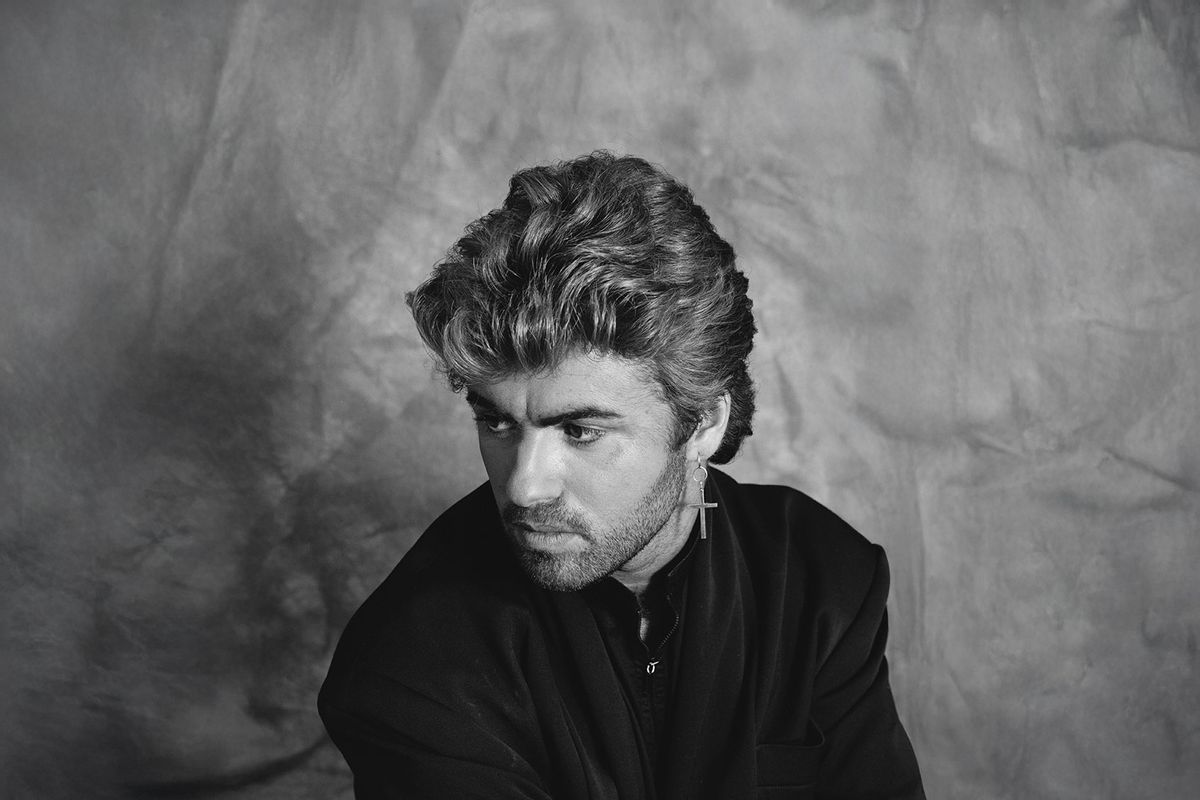'Tis the season to listen to George Michael.
This time of year, it feels like the late British musician is always playing in a never-ending loop in our minds because of the song "Last Christmas" when he was with Wham! But the holiday season is not the only reason we have been plugged into the music juggernaut's extensive discography. Halina Reijn's new erotic thriller "Babygirl," starring Nicole Kidman and Harris Dickinson, is the latest film that has renewed interest in one of Michael's biggest hits: 1987's "Father Figure."
Reijn's film is a meditation on psychosexual power dynamics between an influential, married tech CEO Romy (Kidman) and her 20-something intern Samuel (Dickinson) with whom she begins an affair. Near the end of the film, sexual energy in Romy and Samuel's dangerous relationship reaches new heights in a bougie hotel room rendezvous.
In the scene, the shirtless, tattooed Samuel seduces Romy in a soaring intimate dance as "Father Figure" plays, paralleling the actions of this dominant and suave paramour. The scene is intercut with some kinky foreplay like Romy lapping up milk from a plate like a cat. But the camera lingers on Dickinson as Samuel grooves to Michael's lyrics, "I will be your father figure/Put your tiny hand in mine" and ends with Romy in his arms. It's a scene picking up steam online, with some people including actor Pedro Pascal recreating it in a video.
Before the attention on Dickinson's alluring dance, Michael's "Father Figure" has had a massive impact on pop culture already. Salon dives into "Father Figure":
The history behind "Father Figure"
Released in December 1987, "Father Figure" was one of many popular singles from the British musician's first solo album "Faith." The R&B-influenced ballad shot to No. 1 on the U.S. Billboard charts and stayed there for two weeks. But the song was not without controversy due to its racy lyrics, Michael's shifting public perception and his sexuality.
The subversive lyrics highlighted a 24-year-old Michael expressing his desires. Some have called the song "inappropriate" because of its references to wanting to be someone's "daddy." Billboard reporter Barry Walters explained in 2017, "'Father Figure' allowed George to celebrate forbidden desires without drawing explicit attention to his own."
Michael experimented with his music by exploring his personal life through innuendo and romance. He longs for a "sacred" relationship, adding religious undertones to the seductive song. In lyrics like "That's all I wanted/But sometimes love can be mistaken/For a crime," he hints at the forbidden nature of his own desires.
Nearly a decade later, the singer became a vocal proponent for LGBTQ+ equality and rights after he was outed as gay in 1996 after being arrested for "a lewd act." The arrest led to the singer being humiliated for his sexuality in the media, The Guardian reported.
"Father Figure" and its impact in music
Nearly four decades after the song's release, Michael's impact is still felt through the music and film that came after him.
Throughout the '90s and '00s, many artists took inspiration from Michael's hit for their own songs. Hip-hop group Jungle Brothers sampled the track in their single "J. Beez Comin' Through" and so did R&B artist P.M. Dawn in his song "Looking Through Patient Eye."
But the most recognizable example is LL Cool J's "Father." The song's intro is eerily similar to Michael's. However, Cool J added hip-hop elements and a choir while he rapped the lyrics, "All I ever needed was a father."
Other artists like Tori Amos, Noah Guthrie and Murray Hockridge and Dave Kilminster have also covered the song.
Even one of Michael's music friends, artist Rob Thomas told GQ in 2017 that Michael inspired his music. He said, “I’ve stolen so much from George. If you look at my ‘Lonely No More’ video, it is shot for shot little George Michael rip-offs.”
"Father Figure" on screen, beyond "Babygirl"
The song has also held onto its relevance on many other soundtracks through the decades. In the 2010s, films such as the lethal spy film "Atomic Blonde" starring Charlize Theron, the cat buddy comedy "Keanu" starring Jordan Peele, Keegan-Michael Key and Keanu Reeves (which reportedly goes into depth about the song's meaning in a scene) and the Christmas comedy, "The Night Before," starring Seth Rogen, Joseph Gordon-Levitt and Anthony Mackie, all featured "Father Figure."
But "Father Figure's" central theme is the most actualized in a movie like "Babygirl." When Michael sings "I will be your preacher teacher (Be your daddy)," he shows an interest in role-playing and power dynamics seen in some sexual and romantic relationships, mirroring Samuel and Romy's affair. This similar kinky tension is also seen in the dreamy "Father Figure" video where Michael's dominating female love interest, supermodel Tania Coleridge, toys with two men who want her while she has all the power.
Ultimately, "Father Figure's" impact hinges on Michael's expression of desire and manhood in the '80s, which "Babygirl" then explores from a female perspective.



Shares